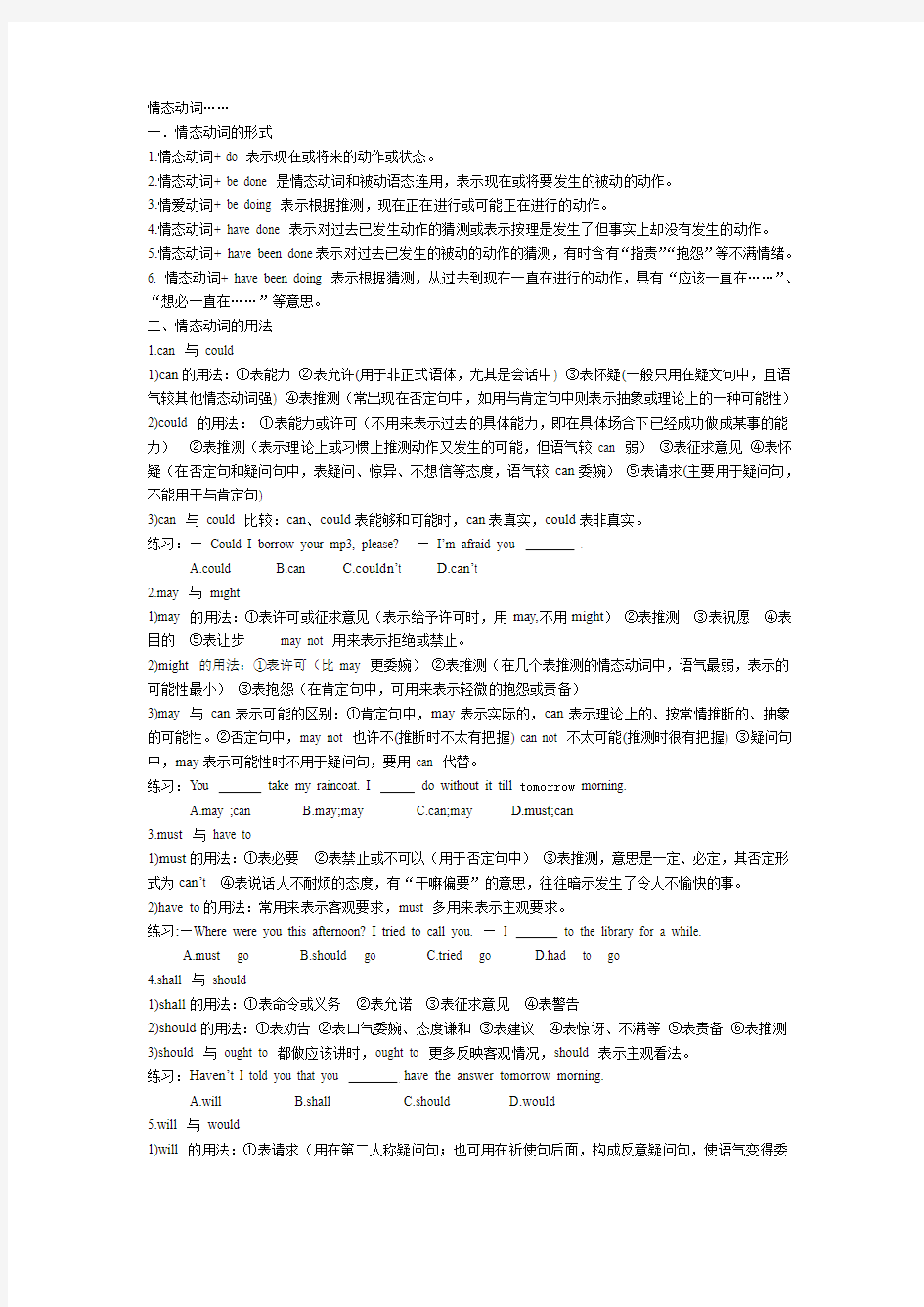

情态动词……
一.情态动词的形式
1.情态动词+ do 表示现在或将来的动作或状态。
2.情态动词+ be done 是情态动词和被动语态连用,表示现在或将要发生的被动的动作。
3.情爱动词+ be doing 表示根据推测,现在正在进行或可能正在进行的动作。
4.情态动词+ have done 表示对过去已发生动作的猜测或表示按理是发生了但事实上却没有发生的动作。
5.情态动词+ have been done表示对过去已发生的被动的动作的猜测,有时含有“指责”“抱怨”等不满情绪。
6. 情态动词+ have been doing 表示根据猜测,从过去到现在一直在进行的动作,具有“应该一直在……”、“想必一直在……”等意思。
二、情态动词的用法
1.can 与could
1)can的用法:①表能力②表允许(用于非正式语体,尤其是会话中) ③表怀疑(一般只用在疑文句中,且语气较其他情态动词强) ④表推测(常出现在否定句中,如用与肯定句中则表示抽象或理论上的一种可能性)2)could 的用法:①表能力或许可(不用来表示过去的具体能力,即在具体场合下已经成功做成某事的能力)②表推测(表示理论上或习惯上推测动作又发生的可能,但语气较can 弱)③表征求意见④表怀疑(在否定句和疑问句中,表疑问、惊异、不想信等态度,语气较can委婉)⑤表请求(主要用于疑问句,不能用于与肯定句)
3)can 与could 比较:can、could表能够和可能时,can表真实,could表非真实。
练习:—Could I borrow your mp3, please? —I’m afraid you .
A.could
B.can
C.could n’t
D.can’t
2.may 与might
1)may 的用法:①表许可或征求意见(表示给予许可时,用may,不用might)②表推测③表祝愿④表目的⑤表让步may not 用来表示拒绝或禁止。
2)might 的用法:①表许可(比may 更委婉)②表推测(在几个表推测的情态动词中,语气最弱,表示的可能性最小)③表抱怨(在肯定句中,可用来表示轻微的抱怨或责备)
3)may 与can表示可能的区别:①肯定句中,may表示实际的,can表示理论上的、按常情推断的、抽象的可能性。②否定句中,may not 也许不(推断时不太有把握) can not 不太可能(推测时很有把握) ③疑问句中,may表示可能性时不用于疑问句,要用can 代替。
练习:You take my raincoat. I do without it till tomorrow morning.
A.may ;can
B.may;may
C.can;may
D.must;can
3.must 与have to
1)must的用法:①表必要②表禁止或不可以(用于否定句中)③表推测,意思是一定、必定,其否定形式为can’t ④表说话人不耐烦的态度,有“干嘛偏要”的意思,往往暗示发生了令人不愉快的事。
2)have to的用法:常用来表示客观要求,must 多用来表示主观要求。
练习:—Where were you this afternoon? I tried to call you. —I to the library for a while.
A.must go
B.should go
C.tried go
D.had to go
4.shall 与should
1)shall的用法:①表命令或义务②表允诺③表征求意见④表警告
2)should的用法:①表劝告②表口气委婉、态度谦和③表建议④表惊讶、不满等⑤表责备⑥表推测
3)should 与ought to 都做应该讲时,ought to 更多反映客观情况,should 表示主观看法。
练习:Haven’t I told you that you have the answer tomorrow morning.
A.will
B.shall
C.should
D.would
5.will 与would
1)will 的用法:①表请求(用在第二人称疑问句;也可用在祈使句后面,构成反意疑问句,使语气变得委
婉)②表意愿③用于否定句,表示主与拒绝或不愿做某事;用于非人称主语时,表示物体的固有性质和倾向。表示固执坚持的will,不可使用‘ll 的简略形式。④表习惯⑤表推测(可能性较大)⑥表倾向⑦表能力(用在无生命的主语后)⑧表规律(表示根据自然规律必然会发生的事)
2)would的用法:①表意志②表过去习惯③表请求④表推测(对过去发生的事的推测) ⑤用于if 的条件从句,也表意愿。
练习:If you lend me some money ,I buy that book.
A.will ; can
B.would ; may
C.shall ; could
D.should ; will
6.ought to 的用法:①表义务,意思为应该,口气比should 稍重。②表推测,暗含很大的可能。③表责备,ought to + have done 结构可表示过去应该做但没做的事,带有责备语气。
练习:One for what one hasn’t done.
A.ought not to be punished
B.ought to not be punished
C.oughtn’t to have been punished
D.ought not to have been punished
You this morning if you really wanted to see it yourself.
A.ought to come
B.may have come
C.ought to have come
D.could come
https://www.doczj.com/doc/8e14245954.html,ed to 的用法:意思是“过去常常”,暗示此习惯或状态现已不存在。
8.need 与dare
1) need 的用法:表主观或客观上的需要,多用于疑问句和否定句,且只有一般现在时。
2) dare 的用法:指勇气和胆量上的可能,相当于“敢”,一般不用于肯定句中。
三、情态动词+have done
1.表示推测估计:
①may/might have done 可用于肯定句或否定句,意为“大概已经”,表示对过去事实不大肯定的推测。
②can/could have done 通常用于疑问句和否定句(could 有时可用于肯定句),表示对过去事实的推测。可译为“可能已经”,否定句语气较强。
③must have done 只用于肯定句,表示对过去发生的动作的有把握推测,具有很大的可能性。它的否定形式是can’t / couldn’t have done.
④should have done 表示应该,可能性较小。
⑤will have done 可对已发生的事情表示推测。
2.表示遗憾或责备
①might have done 通常用于肯定句,表示“本可以”,含有轻微的责备或遗憾。
②could have done 通常用于肯定句,表示对过去能做而未做的事感到惋惜、遗憾。
③ should have done 可用于肯定句、否定句和疑问句,表示该做而实际未做,含有责备的意思。
④ought to have done 结构可表示过去应该做但没做的事,带有责备语气。
⑤must have done 用于虚拟语气中时,表示对过去能做到而未做的事感到惋惜。
⑥had better have done 表示对过去最好做了某事而没有做的一种遗憾。
⑦needn’t have done只用于否定句,表示“本没有必要做某事,可却做了”。
四、练习
1.—Shall I tell John about it? —No, you . I’ve told him already.
A.needn’t
B.wouldn’t
C.mustn’t
D.shouldn’t
2.It’s nearly seven o’ clock. Jack be here at any moment.
A.must
B.need
C. s hould
D.can
3.Mary be in Paris. I saw her in town only a few minutes ago.
A.mustn’t
B.shouldn’t
C.can’t
D.may not
4.Johnny, you play with the knife, you hurt yourself.
A.won’t ; can’t
B.mustn’t ; may
C.shouldn’t;must
D.can’t; shouldn’t
5.The fire spread through the hotel very quickly , but everyone get out.
A.had to
B.would
C.could
D.was able to
6.We last night, but we went to the concert instead.
A.must have studied
B.might study
C.should have studied
D.would study
7.Tom ought not to me your secret, but he meant no harm.
A.have told
B.tell
C.be telling
D.having told
8. —There were already five people in the car, but they managed to take me as well.
—It a comfortable journey.
A.can’t be
B.shouldn’t be
C.mustn’t have been
D. couldn’t have been
9.—When can I come for the photos? I need them tomorrow afternoon.
—They be ready by 12:00.
A.can
B.should
C.might
D.need
10. —I stayed at a hotel while in New York. —Oh,did you? You with Barbara.
A. couldn’t have stayed
B.could stay
C.would stay
D.must have stayed
11. —Will you stay for lunch? —Sorry,. My brother is coming to see me.
A.I mustn’t
B.I can’t
C.I needn’t
D.I won’t
12.Sorry I’m late. I have turned off the alarm clock and gone back to sleep again.
A.might
B.should
C.can
D.will
13.I was really anxious about you. You home without a word.
A.mustn’t leave
B.shouldn’t have left
C.couldn’t have left
D.needn’t leave
14. —Is John coming by train? —He should, but he not. He likes driving his car.
A.must
B.can
C.need
D.may
15.Naturally, after I told her what to do, my daughter go and do the opposite !
A.may
B.can
C.must Dshould